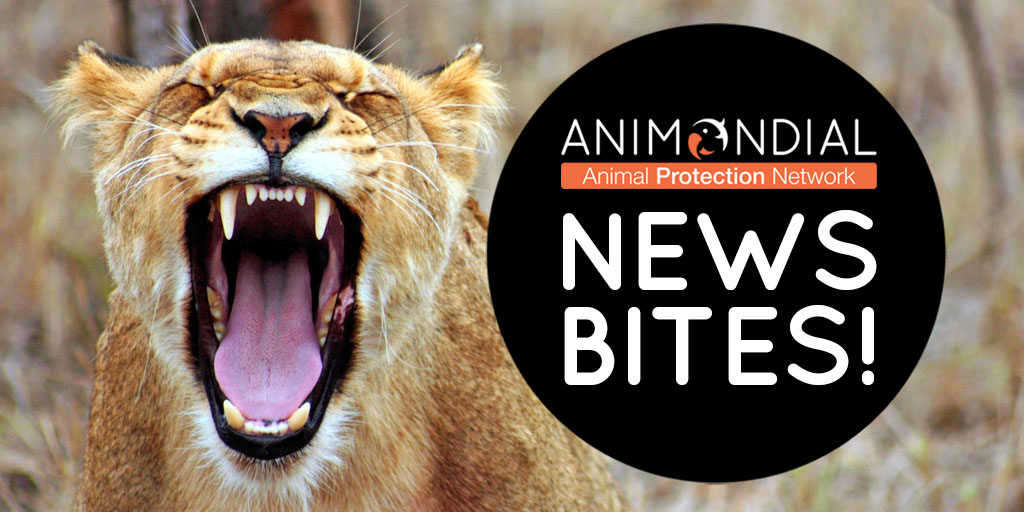NEWS BITES

Reporting on the news that matters. Welcome to ANIMONDIAL’s Animal Protection News Bites, a consolidation of the latest in global animal protection news.
Post-Brexit Rewilding Changes
Rewilding is rapidly becoming incentivised by the UK government under new subsidy programmes. The process of rewilding involves restoring an area of land that has been previously used for other land uses, such as agriculture. The most popular approach is to reintroduce species that have long been absent from the area. These species are crucial in maintaining a self-regulating ecosystem. The Sustainable Farming Incentive (SFI) scheme allows farmers to bid for funding to turn between 500 and 5000 hectares of land into areas used for wildlife protection, flood prevention, or carbon sequestration. The aim of the scheme is to reduce the environmental impact of agriculture by restoring 10,000 acres of land. The scheme has been criticised by experts for being too small-scale, with at least 300,000 hectares required to see any improvement to wildlife.
Source:
Farmers could be paid for post-Brexit ‘rewilding’ land changes | BBC News
Antarctic Invasive Species
Except for some heavily regulated scientists, Antarctica is the only continent on the planet that does not have human inhabitants. The continent has been isolated from the rest of the world for 15–30 million years, which has led to it developing its own unique wildlife. Because of this isolation, any intentional or accidental introduction of other species is strictly forbidden under the Antarctic Treaty System. However, the native wildlife has come under threat from invasive barnacles, mussels, and crabs that have attached themselves to ship hulls. In recent years, tourism has been gradually increasing in the Antarctic, potentially leading to more ships carrying invasive species. Researchers have found that these ships have originated from 1,581 different ports across the planet. The term ‘biofouling’ is used when organisms attach themselves to ships underwater and is the greatest threat to native wildlife. Unfortunately, with increasing access to the Antarctic and higher demand from tourists, the situation is likely to become worse.
Tanzania Promotes Trophy Hunting to the US
Trophy hunting is the practise of paying money to kill a particular animal for the purpose of keeping a souvenir. The US has an enormous trophy hunting market, with 1.26 million wildlife trophies imported into the country between 2005-2014. In 2014, the US imposed a ban on all wildlife-related products from several African countries. Unfortunately, the ban was later lifted in 2018. The Safari Club International hosted its 50th annual hunters’ convention from January 19th to January 22nd, 2022. Tanzanian Tourism Minister Damas Dumbaro was in Las Vegas to promote trophy hunting opportunities to wealthy American tourists. The main focus was to attract individuals who could afford a 21-day hunting safari that would cost approximately $60,000. The allocated hunting experiences were confined to 38 wildlife reserves, controlled game reserves and open areas.
Source:
Tanzania woos US tourists with trophy hunting safaris | The East African
Earth’s Sixth Mass Extinction Event
Humanity is undoubtably changing the natural world as we have influence over the climate and the environment. Sadly, these changes have detrimental impacts on all living creatures, including ourselves. A new scientific study has highlighted the impact humanity has on invertebrates (animals that lack a backbone). The study concluded that approximately 2 million plant and animal species have become extinct since 1500 CE, mainly due to human activity. If we are to prevent future extinctions, tourism has an important role to play. As a tourist, you can have a massive impact on the environment, but there are several ways to minimise this. The first is the reduction in plastic use, as many countries do not have the infrastructure to dispose of and recycle plastic in a sustainable way. Another is to ensure you do not purchase any wildlife products, as almost all are sourced unsustainably. And arguably the most important thing is to check with the tour operator you use. Examine what experiences or practises they provide, whether they are sustainable, and whether they provide incentives to locals to protect wildlife.
Sources:
The 6th Mass Extinction Really Has Begun, Scientists Warn in Newly Published Study | sciencealert.com
6 Ways to Be a More Sustainable Traveler | National Georgraphic
International Sales of Elephants from Namibia
Recently, Namibia has been struggling with conflicts between humans and elephants as humans continue to encroach into their habitat. The country, boasting a large elephant population of 24,000, announced in December 2020 that it would auction off 170 elephants to reduce populations. Last August, an update from the Ministry of Environment, Forestry, and Tourism highlighted that 57 elephants had been successfully sold to three bidders. Out of the 57, only 15 will stay within the country and 42 will be exported. An update on the 15th February 2022 details that 37 have been captured, including 22 that will be exported. Concerns have arisen due to the lack of transparency from the ministry as to where these elephants are being exported to. Under CITES (the Convention on International Trade in Endangered Species), it is illegal to export elephants from Namibia to countries that do not naturally have the species. This rules out countries such as China and the US, but a further CITES meeting will take place in France to discuss the situation.
Source:
Namibia’s wild elephants are being rounded up for international sale | National Georgraphic
Published: 22 FEBRUARY 2022
